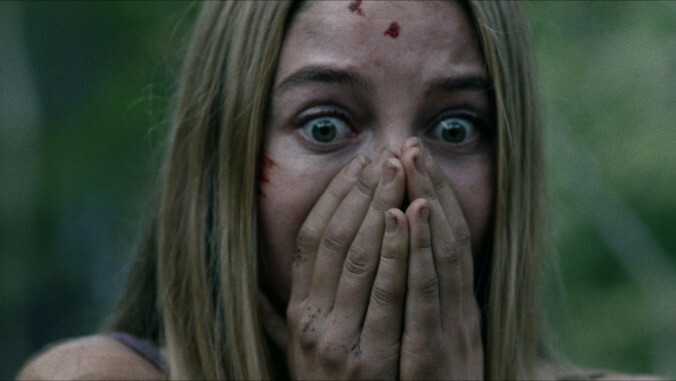This inverted culture-clash reading of the franchise is essential to the Wrong Turn remake, written by original series scribe Alan McElroy and directed by genre journeyman Mike P. Nelson (not to be confused with the longtime MST3K host). It’s a sanctimonious take on the “backwoods bloodbath” concept that has more themes than a sorority events calendar, and none of them come together in any coherent way. Vaguely, the film’s about prejudice and not judging a recluse by his skull mask, as the film jams culture-war politics, socialist posturing, racial tension, and Appalachian stereotypes into an already overstuffed plot. One can almost hear the “apolitical” horror dudes complaining that they can’t even watch hillbillies gutting hot blondes anymore without woke politics getting in the way.
And indeed, Wrong Turn’s clumsy topicality immediately marks the remake as a product of its era, much as midriff-baring ultra-low-rise jeans did for the original. Like that film, this one revolves around a doomed coterie of twentysomething hikers. There’s Jen (Charlotte Vega), the obvious final girl whose indecision is conveyed by an offhand comment about two masters’ degrees, one in dance and the other in art history. Her boyfriend, Darius (Adain Bradley), is an idealistic finance guy who gave up Wall Street money to run a sustainable energy nonprofit. They’re accompanied by two other couples: Milla (Emma Dumont), a smart-ass oncologist, and her fiancé, Adam (Dylan McTee), an app developer; and underdeveloped gay couple Gary (Vardaan Arora) and Luis (Adrian Favela), who run “two New York City bistros.” At first, it seems as if we’re in for an exercise in slasher-movie bad taste, whether the rednecks torture the kids or the kids torture the rednecks. But then the movie decides to catch the folk-horror wave, too.
Turns out there’s a tribe living deep in the woods—but not so deep that you can’t stumble upon them after going a few miles off the Appalachian Trail—that has constructed an alternate society à la 2018’s Apostle, embracing communal living and dressing like Stone Age cave-dwellers even though the community was supposedly founded immediately before the Civil War. If you’re wondering if this colony engages in blood rituals, the answer is “obviously,” though here they’re couched in eye-for-an-eye biblical justice rather than the pagan fertility rites of 2019’s Midsommar. Add Matthew Modine as Jen’s Goretex-clad suburban dad on a mission to find his missing daughter, and you’ve got enough plot for at least two movies—which goes a long way toward explaining Wrong Turn’s bloated 110-minute runtime.
Presumably inspired by the twisted moral dynamics of Ari Aster’s film, Wrong Turn divides its horror thrills between graphic gore and the dramatic presentation of impossible ethical choices. The execution is much cruder here, however, with puffed-up lectures sprinkled throughout so the viewer can’t miss that there are implications to the violence. In between, the cinematography and editing have the generic flash of a commercial for a medication with deadly side effects, or perhaps an app promising to disrupt walking in the woods. Self-aware though the film may be about its motifs, it’s less conscious of the line between ominous and ridiculous. Take, for example, the scene where a character gasps, “We’ve been sleeping in a graveyard!” as the score quavers and the camera pulls back to reveal weed-covered gravestones.
But although its many complications quickly devolve into absurdity, Wrong Turn does deserve some credit for the boldness with which it deviates from its franchise inspiration. This is no paint-by-numbers remake. And although it’s just got way too much going on, the gore is gnarly, the paranoia is palpable, and the characters, while sometimes annoying, have motivations and arcs that make sense. (The ones that make it to the second half, anyway.) And while the message is somehow both nonsensical and preachy, the plot is wild enough that you can still appreciate Wrong Turn on some level, if not as the rich text it aspires to be. Just because the film takes itself too seriously doesn’t mean a viewer has to. It’s better approached with a sense of humor.


